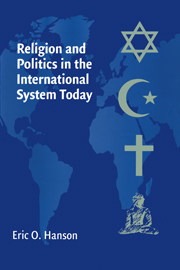Book contents
- Frontmatter
- Contents
- Acknowledgments
- Religion and Politics in the International System Today
- Introdution: The view from Silicon Valley
- I RELIGION AND POLITICS IN THE NEW GLOBAL PARADIGM
- II RELIGION IN CONTEMPORARY WORLD POLITICS
- 5 The West: Christianity, Secularization, and Immigration
- 6 East Asia: Modernization and Ideology
- 7 South and Central Asia: The Legacies of Gandhi and Khomeini and the Bomb
- 8 The Middle East and North Africa: Jewish and Islamic Politics
- 9 Latin America: Indigenous Religions, Christianity, and Globalization
- 10 Religion and Politics for the Next Millennium
- Appendix I Thirty Years of Nobel Peace Prizes, 1975–2004
- Appendix II Paradigm Chart and Category Questions
- Index
5 - The West: Christianity, Secularization, and Immigration
Published online by Cambridge University Press: 06 January 2010
- Frontmatter
- Contents
- Acknowledgments
- Religion and Politics in the International System Today
- Introdution: The view from Silicon Valley
- I RELIGION AND POLITICS IN THE NEW GLOBAL PARADIGM
- II RELIGION IN CONTEMPORARY WORLD POLITICS
- 5 The West: Christianity, Secularization, and Immigration
- 6 East Asia: Modernization and Ideology
- 7 South and Central Asia: The Legacies of Gandhi and Khomeini and the Bomb
- 8 The Middle East and North Africa: Jewish and Islamic Politics
- 9 Latin America: Indigenous Religions, Christianity, and Globalization
- 10 Religion and Politics for the Next Millennium
- Appendix I Thirty Years of Nobel Peace Prizes, 1975–2004
- Appendix II Paradigm Chart and Category Questions
- Index
Summary
This book proposes a post–Cold War paradigm based on the interaction between the contemporary globalizations of the political and EMC systems and the political role of religion at the local, national, regional, and global levels. The political and EMC systems constantly create new, and very complicated, environments in which individuals and societies must make rapid choices on the basis of their perceived personal and communal identities (Who am I? Who are we?). The religious response to political choices depends mainly on three factors: the level of political-religious interaction, from local to global; the nature of the religion, from religions of the book like Christianity to religions of meditative experience like Buddhism; and the regional or national form of political-religious interaction, from the partially secularized West to Islamist Iran. Religion constitutes an autonomous sphere of human activity, but not a system.
This second half of the book, Chapters 5–10, examines religion and politics in the contemporary world to demonstrate the usefulness of the proposed paradigm for understanding international affairs. The reader will grasp that usefulness by focusing on two factors: the horizontal and vertical integration of the four global systems; and the response of the disparate types of political-religious ideologies and organizations to those globalizations. Each of these chapters, then, emphasizes the regional interaction of the political and EMC systems with the major characteristic impacts of religion at the various levels of politics.
- Type
- Chapter
- Information
- Religion and Politics in the International System Today , pp. 123 - 163Publisher: Cambridge University PressPrint publication year: 2006



